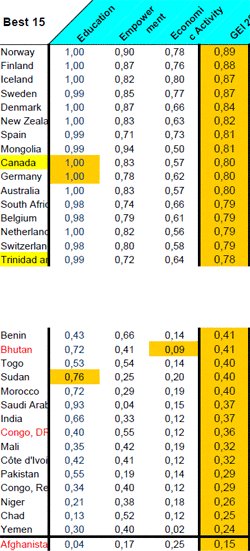Mongolia has the best level of gender equality in East Asia, says watchdog organization
|
Published on Thu, 2012-03-15 11:08
Mongolia is among the few countries in the world that have reached a MEDIUM level of gender equity. In the East Asia & the Pacific region, only New Zealand, in a slightly better condition, and Australia, slightly worse, keep up with Mongolia. This is made apparent by the publication of the Gender Equity Index (GEI) 2012, published by Social Watch on the eve of Women’s International Day, March 8. The index prepared annually by Social Watch measures the gap between women and men in education, the economy and political empowerment. The index is an average of the inequalities in the three dimensions. In literacy, it examines the gender gap in enrolment at all levels; economic participation computes the gaps in income and employment; empowerment measures the gaps in highly qualified jobs, parliament and senior executive positions. Social Watch measures the gap between women and men, not their wellbeing. Thus, a country in which young men and women have equal access to the university receives a value of 100 on this particular indicator. In the same fashion, a country in which boys and girls are equally barred from completing primary education would also be awarded a value of 100. This does not mean that the quality of education in both cases is the same. It just establishes that, in both cases girls are not less educated than boys. Mongolia’s 81 points rank her among those countries with MEDIUM GEI, twelve points above the East Asia & Pacific’s average, which stands at 69. Her neighbour Russia reaches 75 points, while China shows 64. Mongolia is second best in the region, one point below New Zealand (82) and one above Australia (80). There fourth is, The Phillippines (76). The countries in the region presenting a worse gender gap scenario are Lao PDR and Malaysia (both with 56 points), and Cambodia (55). Undral Gombodorj, Director of the Democracy Education Center (DEMO), has pointed out that “a long overdue Law on Gender Equality was passed in Mongolia in February 2011, explicitly prohibiting any act of exclusion, restriction and discrimination against equal rights and equal opportunities of a man and a woman (gender based violence and sexual harassment) in every sphere”. The norm obliges central and local governments, ministries, as well as employers and political parties to install regulations and mechanisms that ensure gender equality in their operations as well as outcomes and to report to the public and the respective higher authorities.
Gombodorj adds that the Civil Service Council (CSC) as well as all employers are to introduce standards preventing gender discrimination, since the legislation also rules that the employer is to be held liable if employees commit acts of gender discrimination in the workplace. The law establishes penalties for individuals, officials, public service agencies, political parties and media organizations for various breaches of gender equality legislation. Subsequent legislative amendments have introduced a 20 percent women’s quota of the candidates from each party for the national parliament and gender relevant provisions in the laws on government, labor, civil service and the NHRC. The Government has also set up a task force to draft a new Gender Equality Action Plan for the next 5 years. Mongolian women NGO’s, including DEMO, are organizing a press and media conference in occasion of the Internatinal Women’s Day. Mongolia reaches an ACCEPTABLE level in education (99 points) and empowerment (94), while in economic participation reaches a VERY LOW level (50 points). At world level, the countries that have achieved the better scores are Norway (89), Finland (88), and Iceland and Sweden (87), Denmark (84), New Zealand (82) and then Spain and Mongolia, with 81. These are the only countries in the world to have achieved a MEDIUM GEI. Out of the 168 countries computed by the 2012 GEI those five in the worst global situation are Congo Rep (29), Niger (26), Tchad (25), Yemen (24) and Afghanistan (15). Social Watch members are spread across all regions. The network fights for the eradication of poverty and its causes, the elimination of all forms of discrimination and racism and to ensure an equitable distribution of wealth and the realization of human rights. For a detailed description of methodology and sources see http://www.socialwatch.org/node/14365 Tags: |
SUSCRIBE TO OUR NEWSLETTER



